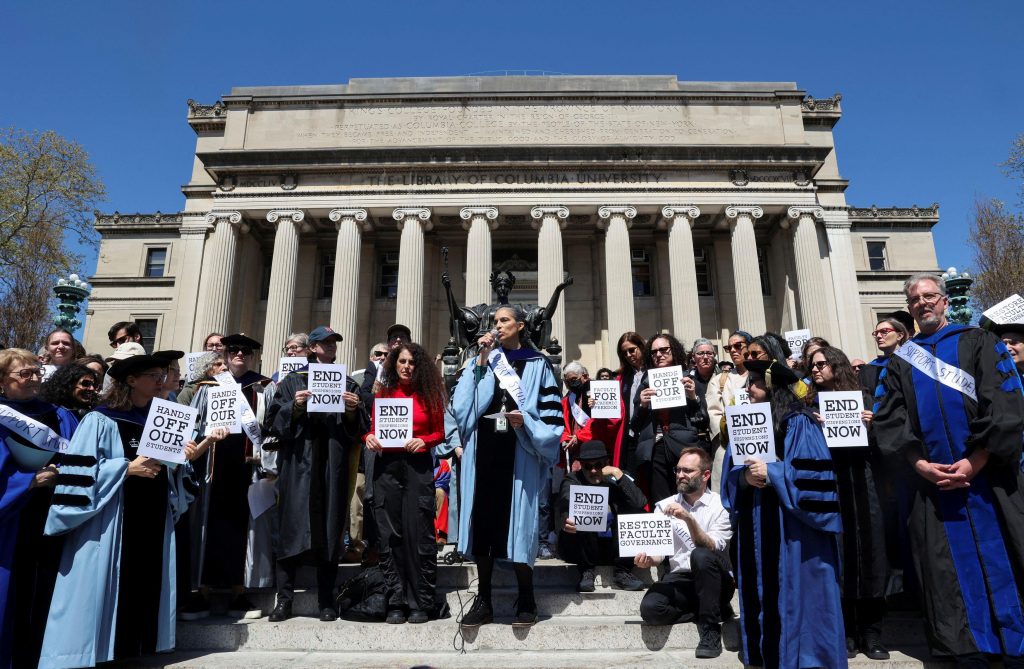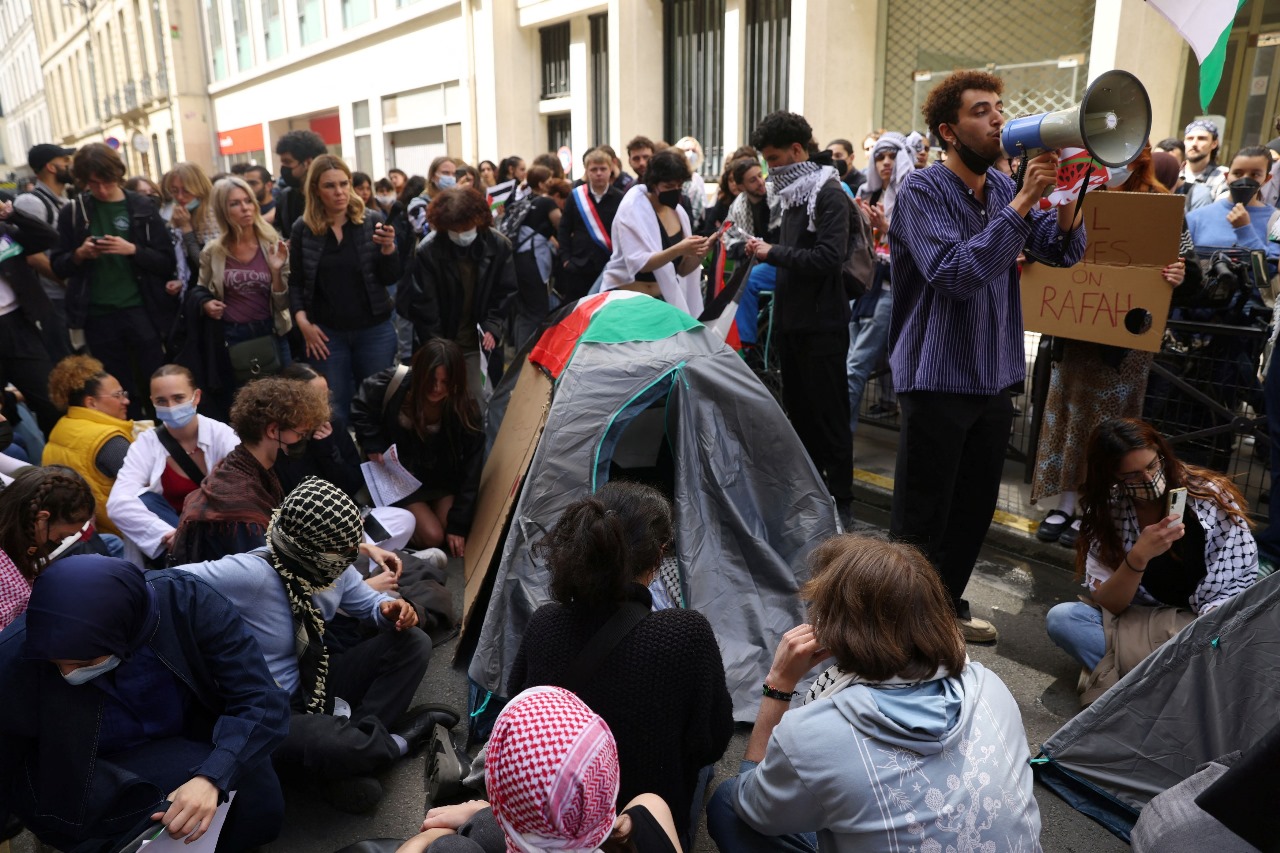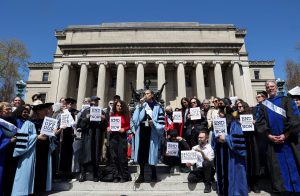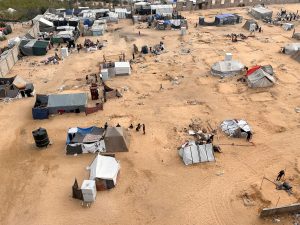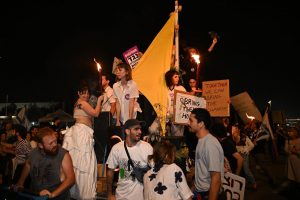PARIS—Protests roiling U.S. universities have ignited a fierce debate over where to set the limit between acceptable criticism of Israel and speech that encourages antisemitism and violence.
In France, government authorities are stepping in to draw the line. Courts have ruled that public speech condoning the Oct. 7 attack or legitimizing Hamas as a resistance movement amounts to condoning terrorism—a crime under French law, punishable by up to seven years in prison. French prosecutors are investigating politicians on the far-left, union officials and hundreds of other people for allegedly condoning terrorism and inciting antisemitism since October.
The clampdown is squeezing France Unbowed, the far-left opposition party that fiercely criticizes Israel and has emerged as a champion of pro-Palestinian protests at colleges across France. The party’s president in the French legislature and one of its candidates in the coming European elections were summoned by the police this week on suspicion of publicly condoning terrorism because of statements they made in the aftermath of the Hamas attack.
Authorities pulled the plug on the party’s plans to hold several conferences on the Middle East at a major university and elsewhere in recent weeks, saying they could sow public disorder.
“We watch with astonishment the violence of the statements that are made in the U.S. in the street, on campuses,” said Oudy Bloch, vice president of the European Jewish Organization, which has filed dozens of complaints with French prosecutors since Oct. 7 over statements it alleges condone the Hamas attack and incite antisemitism. “In France we have seen that if the legislature doesn’t impose limits, it can lead to tragic acts.”
French President Emmanuel Macron’s government is trying to tamp down surging antisemitism in a country that is home to Europe’s largest Jewish community. Antisemitic incidents have jumped since Oct. 7, authorities say. The Paris prosecutor, which leads enforcement of French laws against extremist speech, has opened around 390 of these investigations linked to the conflict between Israel and Hamas. In 2022, it conducted 500 investigations for all kinds of extremist speech over the entire year.
France’s limits on speech are shaped by the country’s history of antisemitism, culminating in the deportation of tens of thousands of Jews to Nazi death camps during World War II. Like much of Europe, France sees U.S.-style free speech—with its broad protections against government intervention under the First Amendment—as a threat to public order that could spark racist and antisemitic violence.
France toughened its penalties for condoning terrorism in 2014 and made it easier to prosecute people for the offense. The change was spurred in part by an Islamist militant’s killing of three children and a teacher at a Jewish school near Toulouse in 2012. The militant cited the deaths of Palestinians as one of the motivations for his attack.
France and the European Union designated Hamas as a terrorist group years before Oct. 7. French courts have ruled that public statements legitimizing the group or expressing approval for its violent actions are thus forbidden by the law against condoning terrorism.
Lawmakers from France Unbowed, however, warn that Macron’s government is trampling on freedom of expression. “In a country you know, the president of an opposition group is summoned before the antiterror police because of a press release,” said Manuel Bompard , the national coordinator of France Unbowed. “Putin’s Russia? No, the France of Macron.”
France Unbowed is a major political force whose leaders have wielded strident anti-Israel rhetoric since Oct. 7. They have spent the last two weeks encouraging pro-Palestinian protesters who shut down the elite Sciences Po university in Paris last week and then camped out at the Sorbonne in the Latin Quarter.
“They are importing the conflict into our schools,” said Justice Minister Eric Dupond-Moretti .
The far-left is riding political forces unleashed by the war in Gaza. Tensions between Jewish people and France’s large Muslim minority have split the country profoundly, extending well beyond the unrest on campuses. France Unbowed draws much of its political support from the suburbs of Paris, home to some of Europe’s largest Muslim communities, where antipathy toward Israel runs deep.
Macron’s government is trying to suppress strident anti-Israel sentiment that risks fueling antisemitism. Days after Oct. 7, Dupond-Moretti sent a directive to prosecutors and judges across the country to take a hard line against statements that legitimize Hamas and the attack.
On Tuesday, one of France Unbowed’s candidates in the European elections, Rima Hassan , was summoned to appear before police in an investigation into whether she condoned terrorism. In a November interview with an online media outlet, Hassan was asked whether Hamas’s actions were legitimate.
“True,” she responded. Hassan has also condemned the Hamas attack.
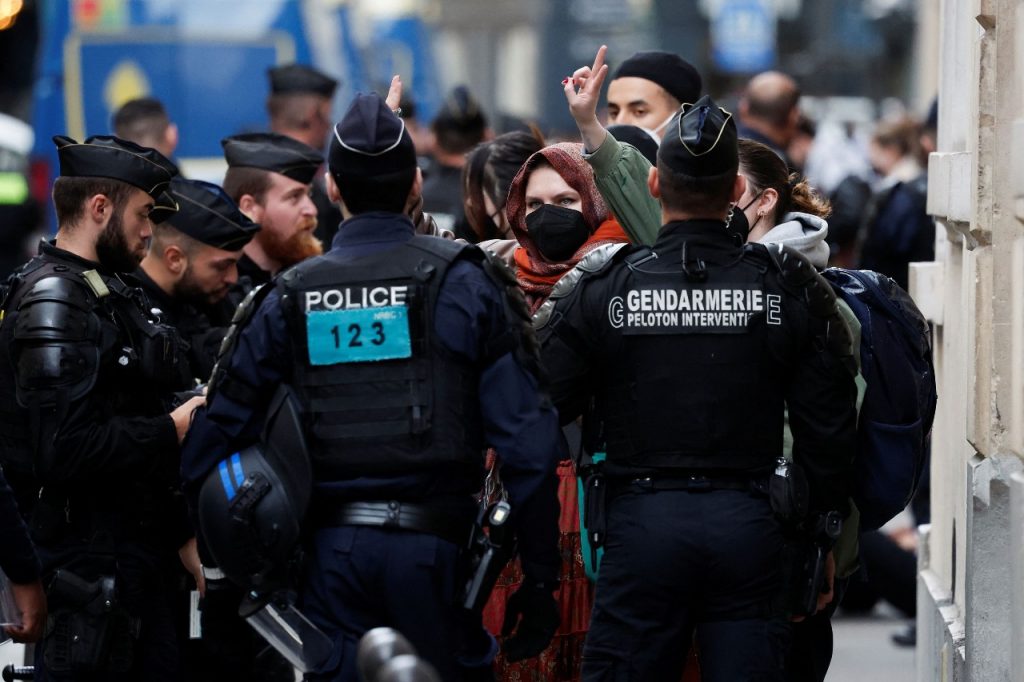
Mathilde Panot , a senior lawmaker in the party, also appeared before prosecutors Tuesday in a similar investigation, according to a copy of her summons. France Unbowed officials say investigators appear to be examining a statement from the party she posted on her X account on Oct. 7 that read: “The armed offensive by Palestinian forces led by Hamas comes in a context of intensification of Israeli occupation policy in Gaza, the West Bank and East Jerusalem.”
The Paris prosecutor’s office didn’t respond to questions about specific investigations.
After appearing before investigators, Hassan said other excerpts of the interview that have yet to be publicly released show her describing Hamas as a terrorist group. A spokeswoman for Hassan didn’t respond to a request for comment.
Panot said Macron’s government is targeting her because she is in the opposition. “To those who summoned me, my message is clear: You are making yourselves complicit today in an attack on freedom of expression and opinion,” she said.
Lille University canceled a France Unbowed conference on the Middle East that was supposed to take place last month shortly after Iran attacked Israel , fearing it could sow public unrest. Jean-Luc Mélenchon, the party’s former far-left presidential candidate who won 22% of the vote in the 2022 election, denounced the university president, comparing him to Adolf Eichmann, the Nazi official who helped organize the Holocaust.
Days later, local officials banned another France Unbowed meeting, and France’s higher education minister said her office would file a complaint against Mélenchon for “public injury” over the Eichmann comment.
Complaints filed by Jewish advocacy groups are behind a number of the investigations. They have brought dozens against members of France Unbowed and other figures on the far-left, including Mélenchon.
At a conference shortly after the attack, Mélenchon said that “Hamas brought an act of war against Israel.” In December, he ended a speech about the conflict by exclaiming: “Eternal glory to those who resist.”
Those two statements violate French law, according to a complaint by the advocacy group French Jewish Youth, because they legitimize Hamas as a warring party when it is listed as a terrorist group. The complaint is still under investigation by the Paris prosecutor’s office, said Anthony Reisberg , an attorney with French Jewish Youth.
“These are people whose voices carry huge weight with the public,” Reisberg said. “The prosecutors were at first reluctant to investigate elected officials, but that seems to have changed with the summons of Panot.”
Mélenchon didn’t respond to a request for comment.
Last month a court handed down a one-year suspended prison sentence for condoning terrorism to a senior official in the CGT union, one of France’s largest, for publishing a tract in the days after the attack that read: “The horrors of the occupation accumulated…. they received the response that they provoked.”
The court said these remarks constituted “the normalization of a terrorist group.”
CGT and the union official didn’t respond to a request for comment.
Write to Matthew Dalton at Matthew.Dalton@wsj.com
